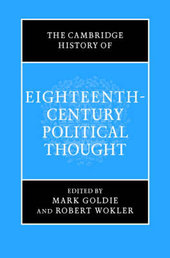
|
The Cambridge History of Eighteenth-Century Political Thought
Hardback
Main Details
| Title |
The Cambridge History of Eighteenth-Century Political Thought
|
| Authors and Contributors |
By (author) Mark Goldie
|
|
By (author) Robert Wokler
|
| Series | The Cambridge History of Political Thought |
|---|
| Physical Properties |
| Format:Hardback | | Pages:936 | | Dimensions(mm): Height 235,Width 160 |
|
| ISBN/Barcode |
9780521374224
|
| Classifications | Dewey:320.09033 |
|---|
| Audience | | Professional & Vocational | |
|---|
|
Publishing Details |
| Publisher |
Cambridge University Press
|
| Imprint |
Cambridge University Press
|
| Publication Date |
31 August 2006 |
| Publication Country |
United Kingdom
|
Description
This major work of academic reference provides a comprehensive overview of the development of western political thought during the European Enlightenment. Written by a distinguished team of international contributors, this Cambridge History is the latest in a sequence of volumes that is now firmly established as the principal reference source for the history of political thought. Every major theme in eighteenth-century political thought is covered in a series of essays at once scholarly and accessible, and the essays are complemented by extensive guides for further reading, and brief biographical notes of the major characters in the text, including Rousseau, Montesquieu and David Hume. Of interest and relevance to students and scholars of politics and history at all levels from beginning undergraduate upwards, this volume chronicles one of the most exciting and rewarding of all periods in the development of western thinking about politics, man (and increasingly woman), and society.
Author Biography
MARK GOLDIE is a University Senior Lecturer in History and a Fellow of Churchill College, Cambridge ROBERT WOKLER taught for many years at the University of Manchester, and currently teaches at Yale University.
Reviews'the six volume Cambridge History of Eighteenth-Century Political Thought is the triumphant embodiment of a collective effort spanning three generations. the scholarly standard is high; the array of volumes gives an impression of careful, massive and reassuring permanence.' Times Literary Supplement
|